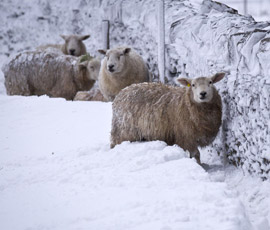Welsh government rules out emergency snow aid

Welsh farmers who lost stock in the heavy snow have hit out at the Welsh government after it ruled out emergency aid.
Farmers have been reporting losses of hundreds of sheep in the deep snow drifts, with dozens more carcasses expected to be found in the coming days as the snow melts.
In total, about 25,000 sheep and cattle are thought to have been killed in this March, the coldest for 50 years.
The Welsh government has announced a seven-day derogation to temporarily allow farmers to bury their fallen stock on farm in the worst affected areas.
However, Alun Davies, Wales’ minister for natural resources and food, has ruled out financial aid for farmers.
This is despite recent announcements by the Scottish government of £500,000 in subsidies and a £5m rescue package in Northern Ireland Executive for snow-hit farmers.
Mr Davies said: “Many businesses across the whole of Wales have suffered terribly over the past few weeks and months because of the weather and a number of businesses are facing significant financial problems.
“In Wales we have an excellent record of making farm payments on time and in full. I now want to work with farmers to hard wire a far greater level of resilience in the industry.
“It is simply not sustainable or fair if we respond to every challenge with a demand for more and greater public support. It is short-termism of the worst kind and does nothing for the long term future of the industry.
“We have already paid out £260m in direct financial contributions to individual farm businesses in the last few months and we now need to make these businesses financially viable.”
Gareth Wyn Jones, of Llanfairfechan, north Wales, has lost 30 sheep in the disaster, but he expects further losses once the snow melts.
He said he was not surprised the Welsh government was not offering extra financial aid for struggling farmers.
“I had hoped that this statement would include an emergency aid package to help those most affected to get back on their feet again, I certainly didn’t expect the Welsh government to rule out such an option before the full extent of losses can even be evaluated.”
NFU Cymru president Ed Bailey
“It has been a living hell for a lot of farmers in mid and north Wales. There are thousands of dead sheep here,” he added.
“Was I asking for any money? No. Was I expecting any money? No. All I know is we have got an agriculture minister, who, if he thought we were in desperate need, would have brought it forward.”
He went on: “I’m very disappointed in the whole government system. As a Welsh nationalist, I thought we would have our own country.
“But by God, if this is the way they treat people in a disaster, I’m glad it was not a war – we would have all died by now.”
However, NFU Cymru president Ed Bailey said he was “surprised” by the government’s stance.
“Surely today the focus should be on looking to support farmers in affected areas who have suffered catastrophic losses,” he added.
“I had hoped that this statement would include an emergency aid package to help those most affected to get back on their feet again, I certainly didn’t expect the Welsh government to rule out such an option before the full extent of losses can even be evaluated.”
Mr Davies is meeting Mr Bailey on his farm in Montgomeryshire today (4 April) to discuss the impact of the severe weather.
He will be asking the minister to remain open minded over an aid package for affected businesses, while the full extent of the losses emerges over the coming weeks.
Meanwhile, Welsh meat promotion agency Hybu Cig Cymru (HCC) warned freezing conditions will have a major effect on the farming industry this year and create “long-term uncertainty” for the Welsh red meat industry.
HCC chief executive Gwyn Howells said: “We are expecting to see a reduced lamb crop this year as the areas which have been worst affected by the freezing conditions are places where sheep farming and lamb production are important parts of the local economy.
“However, the full impact of the snow and cold weather on the industry will not be known until the lambing season has come to an end and the snows have thawed enough to enable farmers to access their livestock.
“Farmers are also facing increases in the cost of producing lamb in the coming months as the weather conditions are forcing them to buy in more feed.”
